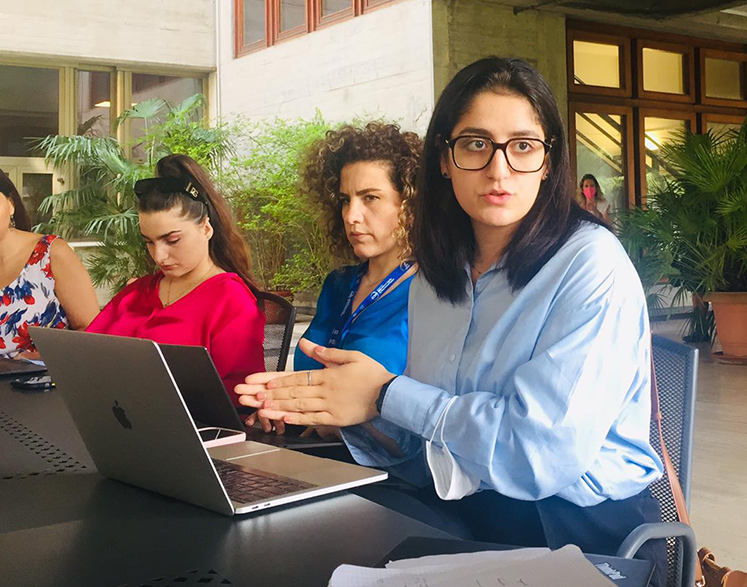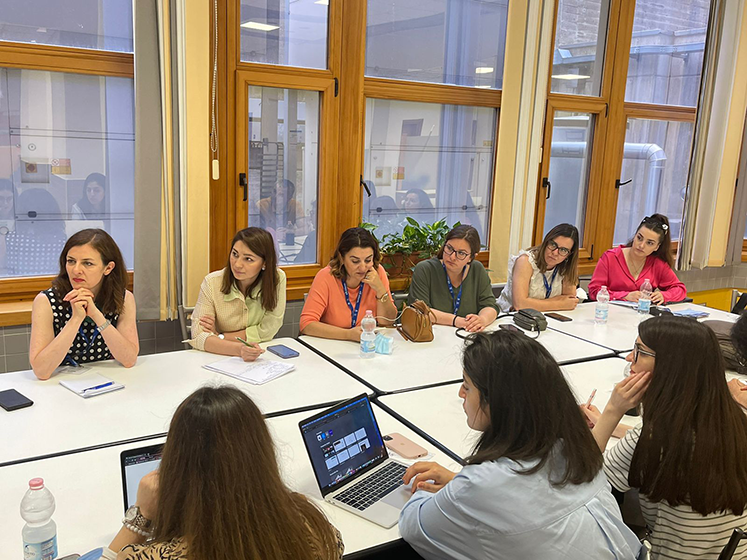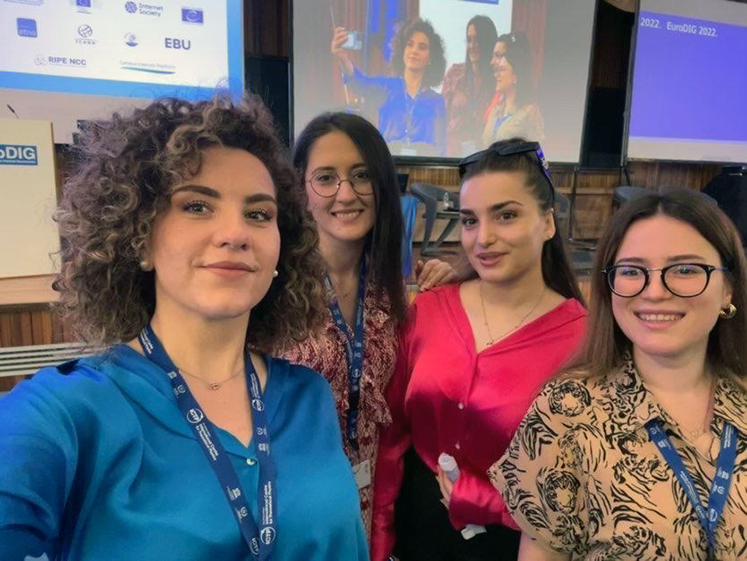Preparing tomorrow’s leaders of cybersecurity
So much of security sector governance focuses on those already in leadership positions, typically people in their 40s or above.
It misses an essential dimension: including young people. There are promising emerging leaders—in their 20s or 30s—who could and should meaningfully be engaged.
DCAF’s annual initiative, Young Faces, brings together dynamic, forward-thinking young people aspiring to improve their knowledge in a particular area of security.
I wanted to be part of DCAF Young Faces because of the many violations of digital rights in my region that are considered minor crimes or even sometimes not considered a crime at all.
Oliver Risteski
This year, Young Faces brought together 30 future leaders from the Western Balkans (Albania, Bosnia and Herzegovina, North Macedonia, Serbia, Montenegro, and Kosovo), for an enriching programme on the emerging trends in cybersecurity governance.

Zhasmin Avetisyan presenting her policy paper at EuroDIG side event. Photo: Sanela Dozgic
The programme started with the winter school: nine webinars with interactive simulations and insights from leading experts. They cover three main topics: Introduction to good governance, Artificial intelligence and cybersecurity, and Human rights and security online.
I am now better positioned to know what online human rights abuses to look for on the European continent.
Alketa Hotaj
Then, participants were invited to develop policy papers covering an array of topical cybersecurity issues such as cryptocurrency-related crime, online child safety, online surveillance and human rights.
I learnt from the mentoring of writing the paper, the useful points of research methodology, and how to identify critical issues for specific topic and narrow the scope of research and realistic recommendation.
Oliver Risteski
Finally, the capstone event was an in-person gathering at the European Dialogue on Internet Governance (EuroDIG) in Italy, alongside the DCAF-created Western Balkans Cybersecurity Research Network and other experts.
DCAF Young Faces presented their policy papers to peers and met renowned experts who gave them direct feedback. It was a unique opportunity, as EuroDIG is the main European event gathering civil society, private sector, technical IT experts, government, and academia together to talk about cybersecurity.

Young Faces participants listening to speakers from Internet Corporation for Assigned
Names and Number (ICANN), Adam Peake and Andrea Beccalli . Photo: DCAF
THE FOUR ADVANTAGES OF JOINING DCAF YOUNG FACES
We asked this year’s participants what it means to be part of the programme. They came back with four key elements:
Developing a cross-border perspective: They learned from peers in neighbouring countries, and had good opportunities to understand how the Western Balkans cybersecurity landscape relates to the issues in key countries in Europe and beyond.
Building a bridge between generations: While they engaged with seasoned experts and learned from them actively, they also had the opportunity to bring fresh perspectives on the table. By the end of the programme, they could envision themselves playing an important role within cybersecurity governance.
The DCAF team ensured we had access to an adequate quantity of information throughout the programme and put us at ease. We could voice our opinions without feeling judged. Every single one of us was accorded the utmost respect, and we were encouraged to share the knowledge we possess.
Alketa Hotaj
Building a bridge between practice and theory: The papers they wrote during the programme are intellectually rigorous, and highly relevant towards current and emerging key cybersecurity issues.
Linking existing models of security sector governance with the specific requirements of cybersecurity governance, which may differ or be similar. What can simply be adapted? What may require an improved or possibly different governance approach?
There is much work in progress in this area, and the Young Faces participants are now better placed to tackle these.
Congratulations to all participants in DCAF’s 2022 Young Faces!

Mejreme Asllani, Doris Pasha, Alketa Hotaj and Sara Qoshi taking a selfie at EuroDIG 2022.
Photo: Mejreme Asllani
Stay tuned for more on this initiative. Three policy papers will be available in the coming months on the DCAF website, and applications for 2023 will open later this year.
EDIT 23.11.2022: The policy papers are now available
- Doris Pasha’s ‘E-Governance and the Importance of Personal Data Protection in Albania’;
- Mejreme Asllani’s ‘Cyber Attacks and Critical Infrastructure in Kosovo*’; and
- Oliver Risteski’s ‘Intrusions of State Digital Infrastructure in Macedonia: Digital Human Rights Impact Analysis’
Disclaimer: The views expressed are those of the authors alone and do not necessarily reflect DCAF positions.
* This designation is without prejudice to positions on status, and is in line with UNSC 1244 and the ICJ Opinion on the Kosovo declaration of independence.
 Share on Facebook
Share on Facebook Share on Linkedin
Share on Linkedin Share on Twitter
Share on Twitter